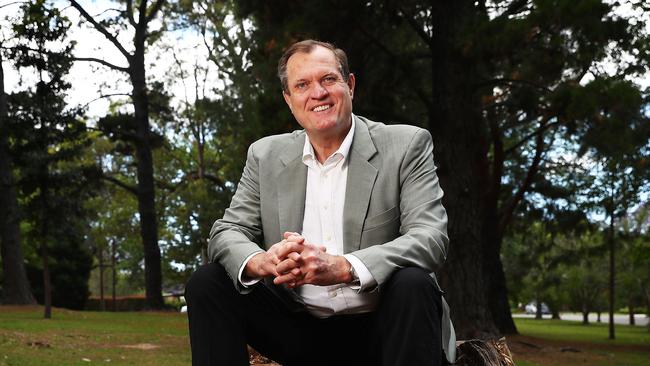Taxman targets specific suburbs in cash-only business blitz
The Australian Taxation Office has launched an audit blitz on neighbourhoods across the nation with high concentrations of cash-only businesses.

The Australian Taxation Office has launched an audit blitz on neighbourhoods across the nation with high concentrations of cash-only businesses, including restaurants, hairdressers and beauty parlours.
The blitz is part of a covert war on the black economy that has already yielded $200 million.
The area-by-area blitz — which includes Sydney’s Cabramatta and Chinatown, Melbourne’s Glen Waverley, Brisbane’s Sunnybank, Adelaide’s Glenelg and Perth’s CBD — was initiated at the behest of Tax Commissioner Chris Jordan.
During his interview series with The Australian, Mr Jordan has revealed the sneak attack on the black economy was a personal initiative, as he attempts to stem the huge leakage of cash from the tax system.
“I’ve pushed this myself,” the commissioner said.
“What we’re doing is hitting every single state: different cities, different areas.
‘‘We walk in through the front door and sometimes they think we’re from immigration, so there are people running out the back door.”
The Australian can today reveal the full list of key areas Mr Jordan has targeted so far, many with large immigrant communities where the use of cash is widely preferred for transactions.
They are: Haymarket (Chinatown), Cabramatta and Liverpool in Sydney; Box Hill, Glen Waverley and Werribee in Melbourne; Sunnybank in Brisbane; the Adelaide CBD and Glenelg in South Australia; and the Canberra, Perth and Gold Coast CBDs.
Some areas have already been remarkably fruitful sources of revenue.
From 159 visits to Sydney’s Chinatown, the ATO uncovered $18.3m in misreported transactions, and imposed $4m in tax and penalties. Cash reported in Chinatown businesses subject to audit increased by 27 per cent.
From 131 visits to Melbourne’s Box Hill, $8m in misreported transactions were uncovered, resulting in $1.8m in tax and penalties. Adelaide saw $2.6m in misreported transactions and $511,000 in tax and penalties imposed from 330 site visits. Meanwhile, the Gold Coast saw 273 site visits, $2.2m in misreported transactions, and $342,000 in tax and penalties imposed by the ATO.
Of a total of 11,000 cash business audits conducted across Australia by the ATO over the last financial year, seven in 10 were forced to increase the amount of tax they paid, yielding the ATO liabilities of $197m in tax and penalties.
The program’s success has virtually guaranteed more areas across Australian will be roped into the ATO crackdown.
Mr Jordan has suggested that Sydney’s Chatswood, another area with a large immigrant population, is one area almost certain to be a future target.
“(They say) ‘Sorry for the inconvenience but we don’t take (bank) cards’,” Mr Jordan said. “Well, why?”
The outcome of the ATO’s area-by-area blitz has revealed a range of potential breaches, including:
● Cash registers with no “till tapes” and frequent misuse of the “no sale” button on transactions;
● A clear lack of record-keeping, with many businesses admitting to not recording all sales or estimating sales information;
● The use by some businesses of a wallet as a cash drawer;
● Misunderstanding of employer obligations, including failure to register for pay-as-you-go (PAYG) tax for staff and to pay superannuation; and
● Some businesses operating without current ABN and GST registrations.
The Cabramatta, Liverpool, Werribee, Glen Waverley, Sunnybank and Glenelg audit programs have all seen high levels of activity in recent months, with audits in some of these areas still under way this week.
Mr Jordan said the ATO had received interesting feedback from businesses in areas such as Cabramatta, revealing that businesses dealing in cash were sparking a ripple effect on other businesses in the same areas.
The tax commissioner has described the situation as a “vicious circle”.
“(In) Cabramatta and then some of the other cities, there’s a predominance of cash-only (businesses),” he said. “And what these businesses say is, because everyone’s dealing in cash they have to spend in cash — so they say I have to be cash, because otherwise people won’t come to me.
“So it gets to be a bit of a vicious circle — people get paid in cash, so they’ll go to a restaurant or a shop that only deals in cash, because someone needs to spend that cash.”
Intriguingly, Mr Jordan said the ATO was drilling down into links between areas with high immigrant populations, high levels of cash-only businesses, and a high proportion of $100 banknotes. “Certain ethnic backgrounds deal in $100 notes,” he said.
The ATO believes that some of this cash is legitimate, but some may not be. “Some of that may just be that they don’t trust the authorities (or) they don’t trust banks,” Mr Jordan said.
It was revealed earlier this year by the federal government’s black economy taskforce that it was investigating the installation of hi-tech chips on $100 notes, or even giving the notes expiry dates, amid suggestions the notes were particularly popular among ethnic Chinese.
ATO sources have told The Australian about 1.6 million small businesses are operating in the cash and hidden economy, across 234 cash-exposed industries.
Being cash-only, or dealing mainly in cash, gives businesses greater opportunity to avoid tax and superannuation obligations.
Focus industries include those that advertise as cash-only and have a high percentage of business to consumer transactions.
These include restaurants, cafes, takeaways, food and clothing retail, pubs, hairdressers and beauty salons.
It is understood that the early reaction to the program has been largely positive, with the ATO staff welcomed by most businesses.
However, small businesses in some areas have not been so obliging. They have asked ATO officers to leave their stores.
Some have even followed the ATO staff to other establishments, and instructed other businesses not to speak with them.







